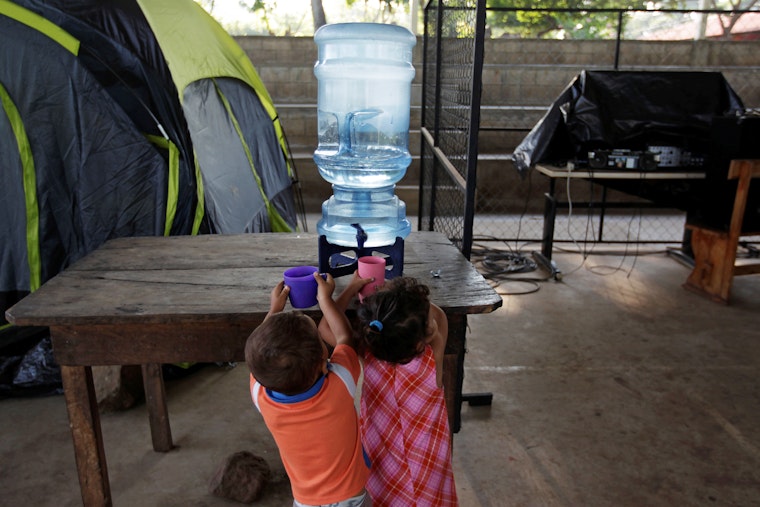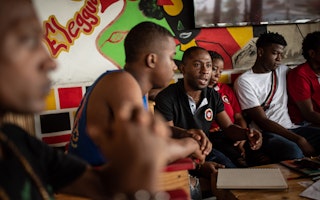El Salvador’s Sky-High Murder Rate Is Creating a Humanitarian Crisis
By Celia Medrano

A few weeks ago, during an interview about the gang violence that has long plagued this country, El Salvador’s Vice President Oscar Ortíz defended his administration, saying, “We are not Afghanistan.” While that may be true, statistics point to a growing humanitarian crisis. In 2015, more than 6,600 people were murdered. That’s 18 murders per day, roughly comparable to the current death rate in war-torn Syria.
Salvadorans are fleeing this violence at unprecedented levels. Statistics from the UNHCR, the UN’s refugee agency, show that the number of Salvadoran asylum seekers worldwide rose from 3,776 in 2010 to 22,675 in 2015—a fivefold increase. According to the Norwegian Refugee Council, there were 288,000 internally displaced persons in El Salvador in 2014. The 2016 Crisis Watch report estimates nearly 330,000, meaning five percent of the Salvadoran population, is internally displaced by violence. In contrast, the portion of internally displaced people around the world is one-half of one percent.
The number of forcibly displaced people in the world—more than 21 million refugees, 3 million asylum seekers, and 40 million internally displaced persons—is higher today than during World War II. Earlier this fall in New York, world leaders were summoned to the United Nations Summit for Refugees and Migrants to address this crisis and the unavoidable overlaps between issues of human mobility, development, human rights, climate change, peace, and security. Another forum will begin in December in Bangladesh.
In New York, a two-year process was put in place to address the refugee crisis and move towards an agreement or global compact, but much more remains to be done. In the Western Hemisphere, the international community must recognize the rights of individuals with valid protection claims and take concrete steps to ensure those rights are respected.
Civil society specifically must focus its efforts to ensure the global compact incorporates the Brazil Action Plan—a framework for the protection of refugees and displaced and stateless persons in Latin America and the Caribbean—as well as state commitments made last August in San José, Costa Rica, during the High-Level Roundtable, Call to Action: Protection Needs in Central America’s Northern Triangle, hosted by the UNHCR and the Organization for American States.
As in many other countries, the government of El Salvador has been reluctant to engage in dialogue about displaced persons, finding it easier to deny the severity—or even the existence—of the problem. In January 2015, the Civil Society Roundtable Against Forced Displacement in El Salvador (of which Cristosal is a founding member) sent a letter to the Secretary General of the UN warning that true peace in El Salvador was not possible with such high levels of generalized social violence.
Since then, this same group of organizations has responded directly to more than 1,019 victims of forced displacement, providing them with both legal and humanitarian assistance and support in finding long-term resettlement options. Civil society, however, cannot replace nor substitute for state responsibilities. Meaningful and effective advocacy will require permanent, open dialogue and collaboration.
These spaces are gradually opening up. Agreements between Cristosal and the Ombudsman’s Office, the Attorney General’s Office, and the National Institute for the Development of Women now recognize the problem of forced displacement in writing, with clear references made to providing “assistance to victims forcibly displaced by generalized violence in El Salvador.”
This is critical because, although the government does not officially recognize internal displacement by violence, individual state agencies are taking clear steps to prioritize assistance to people who suffer displacement. Much remains to be done, however, at higher levels within the executive branch. International discussions such as those in New York and Bangladesh can contribute to the building of bridges for dialogue between civil society and governments on this issue.
Durable solutions for displaced persons require a broad, long-term vision based on institutional coordination with active participation from affected communities, state authorities, and the victims themselves. Forced displacement and migration must be addressed with a human rights–based approach to the development and implementation of security policies.
That’s what is on the agenda in December at the summit in Bangladesh, including the current reality of El Salvador and the other Northern Triangle countries in Central America. Like Afghanistan, El Salvador is near the top of the list of the world’s most violent countries. Until we find a path to peace that at its core recognizes the existence and rights of victims, our displacement crisis will continue.
Cristosal is a grantee of the Central America and Mexico Migration Alliance, which receives support from the Open Society Foundations.
Celia Medrano is chief program officer at Cristosal.


